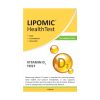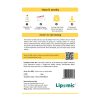Vitamin D3 Test
Vitamin D3 Test
This at-home lab test measures 25-hydroxyvitamin D (25-OH D), also known as vitamin D3, considered tobe the best indicator of systemic vitamin D levels. This test helps determine if you are maintaining an adequate level of vitamin D, which is essential for bone health, cellular function, and immune system support. Regularly checking your vitamin D levels can provide valuable insights into your overall health, helping to prevent deficiencies that could lead to conditions like osteoporosis, weakened immunity, and other health issues.
Key Indicators Reported: Vitamin D3 (Cholecalciferol)
₹800.00
Only customers holding Indian debit or credit cards may place their order through this portal. International customers are requested to write to us at [email protected] so that we may assist them in placing the order.
General FAQs
A DBS test follows a home-to-lab test principle. After ordering, you will receive a kit containing everything needed to collect a dried blood sample. Simply follow the instruction video and the instruction manual to collect your sample. Simply return your sample to us using the pre-addressed envelope provided.
Home-to-lab testing allows individuals to collect samples comfortably at home. The main advantages of home sampling include convenience, privacy, and accessibility, as individuals can perform the tests at their own convenience.
Once the sample is collected, it is sent to our laboratory for analysis from anywhere in the world. You will be notified on your registered email once the results are ready, and can be downloaded from your registered account.
DBS testing is no more painful than a self-prick for a glucometer test. The kit contains one-time-use safety lancets which are used for pricking a finger and depositing a sample on a special filter paper card. The blood spot deposited on the filter paper card is allowed to dry, and hence the name dried blood spot. Similarly, some tests may require saliva, urine or stool samples, which can also be collected on special filter paper cards. This makes the sample collection completely non-invasive.
Watching the instructional video and carefully reading the instruction manual before conducting the test should ensure a smooth experience. Should you encounter any difficulties, please do not hesitate to contact us for assistance.
Once we receive your sample, the average response time is 7-10 business days to receive the results.
Lipomic LifeSciences can provide evidence-based suggestions for lifestyle changes that you can make to positively impact your health. We can also connect you with leading medical experts who can guide and discuss potential next steps.
Test Specific FAQs
Vitamin D is a fat-soluble vitamin that plays a crucial role in several important functions within the body. There are two primary forms of vitamin D:
Vitamin D2 (ergocalciferol): This form is found in some plant foods and is often used in supplements.
Vitamin D3 (cholecalciferol): This form is synthesized by the skin when exposed to ultraviolet B sunlight. It is also found in certain animal-based foods and is commonly used in vitamin D supplements.
Vitamin D is also considered a hormone because of its role in regulating important physiological processes within the body, beyond its traditional association with vitamins and minerals.
Calcium and Phosphorus Regulation: Vitamin D helps regulate the absorption of calcium and phosphorus in the intestines, promoting healthy bone development and maintenance.
Bone Health: Adequate levels of vitamin D are essential for the formation and maintenance of strong and healthy bones. It works in conjunction with calcium to prevent conditions like osteoporosis and rickets.
Immune System Support: Vitamin D is believed to play a role in supporting the immune system and may have protective effects against certain diseases.
Cell Growth and Differentiation: Vitamin D is involved in the regulation of cell growth, differentiation, and apoptosis (cell death). It has implications in various physiological processes.
Inflammation Regulation: Vitamin D may have anti-inflammatory effects and is being studied for its potential role in preventing or managing inflammatory conditions.
Serotonin Production: Serotonin, a neurotransmitter associated with mood regulation, has been linked to vitamin D. Research suggests that vitamin D may influence the production of serotonin in the brain.
Sunlight: Unlike other vitamins, vitamin D is unique in that it can be synthesized in the skin through exposure to ultraviolet B sunlight. The precursor form of vitamin D undergoes conversion in the liver and kidneys to its active form, calcitriol. This activation process is similar to how hormones are synthesized and activated.
Diet: Some foods naturally contain vitamin D, including fatty fish (such as salmon and mackerel), egg yolks, and liver. Additionally, certain fortified foods, like milk, orange juice, and breakfast cereals, may contain added vitamin D.
Supplements: Vitamin D supplements are commonly used, especially in cases where dietary intake or sunlight exposure is insufficient. Vitamin D supplements are available in both D2 and D3 forms.
It’s important to note that while vitamin D is essential for health, excessive intake can lead to toxicity. Vitamin D levels can be influenced by factors such as sun exposure, diet, age, and geographic location.
While maintaining adequate vitamin D levels is important for overall health, it should not be considered a standalone treatment without proper evaluation and guidance from a healthcare professional.
Sample Report
General FAQs
A DBS test follows a home-to-lab test principle. After ordering, you will receive a kit containing everything needed to collect a dried blood sample. Simply follow the instruction video and the instruction manual to collect your sample. Simply return your sample to us using the pre-addressed envelope provided.
Home-to-lab testing allows individuals to collect samples comfortably at home. The main advantages of home sampling include convenience, privacy, and accessibility, as individuals can perform the tests at their own convenience.
Once the sample is collected, it is sent to our laboratory for analysis from anywhere in the world. You will be notified on your registered email once the results are ready, and can be downloaded from your registered account.
DBS testing is no more painful than a self-prick for a glucometer test. The kit contains one-time-use safety lancets which are used for pricking a finger and depositing a sample on a special filter paper card. The blood spot deposited on the filter paper card is allowed to dry, and hence the name dried blood spot. Similarly, some tests may require saliva, urine or stool samples, which can also be collected on special filter paper cards. This makes the sample collection completely non-invasive.
Watching the instructional video and carefully reading the instruction manual before conducting the test should ensure a smooth experience. Should you encounter any difficulties, please do not hesitate to contact us for assistance.
Once we receive your sample, the average response time is 7-10 business days to receive the results.
Lipomic LifeSciences can provide evidence-based suggestions for lifestyle changes that you can make to positively impact your health. We can also connect you with leading medical experts who can guide and discuss potential next steps.
Test Specific FAQs
Vitamin D is a fat-soluble vitamin that plays a crucial role in several important functions within the body. There are two primary forms of vitamin D:
Vitamin D2 (ergocalciferol): This form is found in some plant foods and is often used in supplements.
Vitamin D3 (cholecalciferol): This form is synthesized by the skin when exposed to ultraviolet B sunlight. It is also found in certain animal-based foods and is commonly used in vitamin D supplements.
Vitamin D is also considered a hormone because of its role in regulating important physiological processes within the body, beyond its traditional association with vitamins and minerals.
Calcium and Phosphorus Regulation: Vitamin D helps regulate the absorption of calcium and phosphorus in the intestines, promoting healthy bone development and maintenance.
Bone Health: Adequate levels of vitamin D are essential for the formation and maintenance of strong and healthy bones. It works in conjunction with calcium to prevent conditions like osteoporosis and rickets.
Immune System Support: Vitamin D is believed to play a role in supporting the immune system and may have protective effects against certain diseases.
Cell Growth and Differentiation: Vitamin D is involved in the regulation of cell growth, differentiation, and apoptosis (cell death). It has implications in various physiological processes.
Inflammation Regulation: Vitamin D may have anti-inflammatory effects and is being studied for its potential role in preventing or managing inflammatory conditions.
Serotonin Production: Serotonin, a neurotransmitter associated with mood regulation, has been linked to vitamin D. Research suggests that vitamin D may influence the production of serotonin in the brain.
Sunlight: Unlike other vitamins, vitamin D is unique in that it can be synthesized in the skin through exposure to ultraviolet B sunlight. The precursor form of vitamin D undergoes conversion in the liver and kidneys to its active form, calcitriol. This activation process is similar to how hormones are synthesized and activated.
Diet: Some foods naturally contain vitamin D, including fatty fish (such as salmon and mackerel), egg yolks, and liver. Additionally, certain fortified foods, like milk, orange juice, and breakfast cereals, may contain added vitamin D.
Supplements: Vitamin D supplements are commonly used, especially in cases where dietary intake or sunlight exposure is insufficient. Vitamin D supplements are available in both D2 and D3 forms.
It’s important to note that while vitamin D is essential for health, excessive intake can lead to toxicity. Vitamin D levels can be influenced by factors such as sun exposure, diet, age, and geographic location.
While maintaining adequate vitamin D levels is important for overall health, it should not be considered a standalone treatment without proper evaluation and guidance from a healthcare professional.
Sample Report











